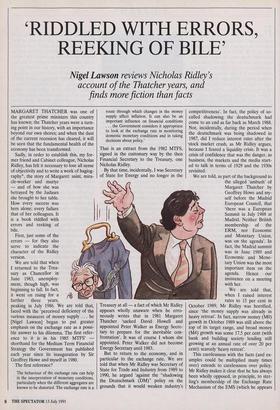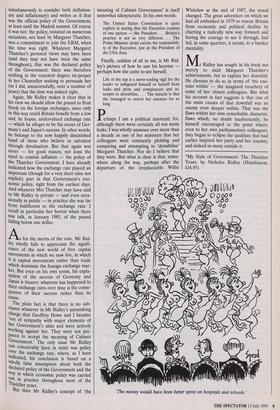`RIDDLED WITH ERRORS, REEKING OF BILE'
Nigel Lawson reviews Nicholas Ridley's
account of the Thatcher years, and finds more fiction than facts
MARGARET THATCHER was one of the greatest prime ministers this country• has known; the Thatcher years were a turn- ing point in our history, with an importance beyond our own shores; and when the dust of the current recession has cleared, it will be seen that the fundamental health of the economy has been transformed.
First, just some of the errors — for they also serve to indicate the character of the Ridley version.
We are told that when I returned to the Trea- sury as Chancellor in June 1983, unemploy- ment, though high, was beginning to fall. In fact, it went on rising for a further three years, peaking in July 1986. We are told that, faced with the 'perceived deficiency of the various measures of money supply . • he [Nigel Lawson] began to put greater emphasis on the exchange rate as a possi- ble answer to his dilemma. The first refer- ence to it is in his 1985 MTFS' shorthand for the Medium Term Financial Strategy the Government has published each year since its inauguration by Sir Geoffrey Howe and myself in 1980.
The first reference?
The behaviour of the exchange rate can help in the interpretation of monetary conditions, particularly when the different aggregates are known to be distorted. The exchange rate is a route through which changes in the money supply affect inflation. It can also be an important influence on financial conditions . . . the Government considers it appropriate to look at the exchange rate in monitoring domestic monetary conditions and in taking decisions about policy.'
That is an extract from the 1982 MTFS, signed in the customary way by the then Financial Secretary to the Treasury, one Nicholas Ridley.
By that time, incidentally, I was Secretary of State for Energy and no longer in the Treasury at all — a fact of which Mr Ridley appears wholly unaware when he erro- neously writes that in 1981 Margaret Thatcher 'sacked David Howell and appointed Peter Walker as Energy Secre- tary to prepare for the inevitable con- frontation'. It was of course I whom she appointed. Peter Walker did not become Energy Secretary until 1983.
But to return to the economy, and in particular to the exchange rate. We are told that when Mr Ridley was Secretary of State for Trade and Industry from 1989 to 1990, he argued 'against the "shadowing the Deutschmark (DM)" policy on the grounds that it would weaken industry's competitiveness'. In fact, the policy of so- called shadowing the deutschmark had come to an end as far back as March 1988. Nor, incidentally, during the period when the deutschmark was being shadowed in 1987, did I reduce interest rates after the 'stock market crash, as Mr Ridley argues, because I feared a liquidity crisis. It was a crisis of confidence that was the danger, as business, the markets and the media start- ed to talk in terms of 1929 and the 1930s revisited.
We are told, as part of the background to the alleged 'ambush' of Margaret Thatcher by Geoffrey Howe and my- self before the Madrid European Council, that `there was a European Summit in July 1988 at Madrid. Neither British membership of the ERM, nor Economic and Monetary Union, was on the agenda'. In fact, the Madrid summit was in June 1989 and Economic and Mone- tary Union was the most important item on the agenda. Hence our insistence on a meeting with her.
We are told that, when I raised interest rates to 15 per cent in October 1989, Mr Ridley was horrified, since 'the money supply was already in heavy retreat'. In fact, narrow money (MO) growth in October 1989 was still above the top of its target range, and broad money (M4) growth was some 17.5 per cent (with bank and building society lending still growing at an annual rate of over 20 per cent): scarcely 'heavy retreat'.
This carelessness with the facts (and ex- amples could be multiplied many times over) extends to carelessness over policy. Mr Ridley makes it clear that he has always been wholly opposed, in principle, to ster- ling's membership of the Exchange Rate Mechanism of the EMS (which he appears simultaneously to consider both deflation- ary and inflationary) and writes as if that was the official policy of the Government, at least until the Madrid summit. Of course it was not: the policy, restated on numerous occasions, not least by Margaret Thatcher, was a commitment to join the ERM, when the time was right. Whatever Margaret Thatcher's personal views may have been (and they may not have been the same throughout), that was the declared policy of the Government; there was therefore nothing in the remotest degree im-proper in her Chancellor seeking to persuade her (as I did, unsuccessfully, over a number of years) that the time was indeed right.
Again, Mr Ridley makes it clear that in his view we should allow the pound to float freely on the foreign exchanges, since only in this way could Britain benefit from a low and, he hopes, undervalued exchange rate — which he alleges to be the secret of Ger- many's and Japan's success. In other words, he belongs to the now happily diminished band of those who believe in salvation through devaluation. But that again was never — for good reason, not least the need to combat inflation — the policy of the Thatcher Government. I have already indicated how the exchange rate played an important (though for a very short time not explicit) part in that Government's eco- nomic policy, right from the earliest days. And whatever Mrs Thatcher may have said to Mr Ridley in private — and even occa- sionally in public — in practice she was far from indifferent to the exchange rate: I recall in particular her horror when there was talk, in January 1985, of the pound falling below one dollar.
Afor the merits of the case, Mr Rid- ley wholly fails to appreciate the signifi- cance of the new world of free capital movements in which we now live, in which it is capital movements rather than trade which dominate the foreign exchange mar- ket. But even on his own terms, his expla- nation of the success of Germany and Japan is bizarre: whatever has happened to their exchange rates over time is the conse- quence of their success rather than its cause.
The plain fact is that there is no sub- stance whatever in Mr Ridley's astonishing charge that Geoffrey Howe and I became Out of sympathy with major elements of her Government's aims and were actively working against her. They were not pre- pared to accept the meaning of Cabinet Government.' The only issue Mr Ridley can conceivably have in mind was policy over the exchange rate, where, as I have indicated, his conclusion is based on a Wholly false assumption about both the declared policy of the Government and the way in which economic policy was carried out in practice throughout most of the Thatcher years. But then Mr Ridley's concept of 'the meaning of Cabinet Government' is itself somewhat idiosyncratic. In his own words:
The United States Constitution is quite explicit in stating that the Executive consists of one person — the President ... Britain's practice is not so very different.... The Prime Minister alone carries the responsibili- ty of the Executive, just as the President of the USA dots.
Finally, saddest of all to me, is Mr Rid- ley's picture of how he saw his heroine perhaps how she came to see herself.
Life at the top is a never-ending vigil for the leader to safeguard himself or herself from leaks and plots and conspiracies and at- tempts to destabilise.... The miracle is that she managed to outwit her enemies for so long.
Perhaps I am a political innocent; for, although there were certainly all too many leaks, I was wholly unaware over more than a decade as one of her ministers that her colleagues were constantly plotting and conspiring and attempting to 'destabilise' Margaret Thatcher. Nor do I believe that they were. But what is clear is that, some- where along the way, perhaps after the departure of the irreplaceable Willie
Whitelaw at the end of 1987, the mood changed. The great adventure on which we had all embarked in 1979 to rescue Britain from economic and political decline by charting a radically new way forward and having the courage to see it through, had led, in some quarters, it seems, to a bunker mentality.
Mr Ridley has sought in his book not merely to exalt Margaret Thatcher's achievements, but to explain her downfall. He chooses to do so in terms of 'the ene- mies within' — the imagined treachery of some of her closest colleagues. But what his account in fact suggests is that one of the main causes of that downfall was an enemy even deeper within. That was the flaws within her own remarkable character, flaws which, no doubt inadvertently, he himself encouraged to the point where, even to her own parliamentary colleagues, they began to eclipse the qualities that had earlier inspired her party and her country, and indeed so many outside it.
*My Style of Government: The Thatcher Years, by Nicholas Ridley (Hutchinson, £16.95) `The money would have been better spent on hospitals and schools.'



















































 Previous page
Previous page